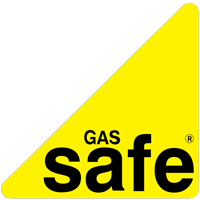Boiler FAQ
- Gas Safe Certified Engineers
- Full Manufacturer Warranties
- Experienced and Professional Gas Boiler Fitters
ARE YOUR GAS APPLIANCES SAFE?
BETTER GAS SAFE THAN SORRY

A condensing boiler is a high-efficiency heating system that extracts heat from the flue gases which would normally be lost to the atmosphere in conventional boilers. These boilers have a larger heat exchanger, allowing them to recover more heat from the combustion process. This results in lower energy bills and reduced carbon emissions.
A combi boiler, short for combination boiler, is a single compact unit that provides both heating and hot water on demand. It heats water directly from the mains, eliminating the need for a hot water cylinder or cold water tank. Combi boilers are ideal for smaller homes with limited space and are known for their efficiency and convenience.
A regular boiler, also known as a traditional or conventional boiler, comprises a heating system with a separate hot water cylinder and cold water storage tank. These boilers are suited for larger homes with multiple bathrooms and high hot water demand. Regular boilers are compatible with existing heating systems and are often preferred in properties with older radiator systems.
A system boiler, or sealed system boiler, is a heating system that incorporates a hot water storage cylinder, but unlike regular boilers, it doesn’t require a cold water tank in the loft. System boilers are efficient and offer high water pressure, making them suitable for homes with multiple bathrooms and high hot water demand. They are compact and compatible with solar water heating systems.
Vaillant solar water heating panels harness the power of sunlight to provide hot water for your home. These panels absorb solar energy and transfer it to a heat transfer fluid, which then heats water in a storage cylinder. Solar water heating panels can significantly reduce energy bills and carbon emissions, making them an eco-friendly and cost-effective solution for heating water.
Solar water heating systems use solar panels, typically mounted on the roof, to collect and absorb sunlight. This energy is then used to heat water for domestic use, such as bathing, washing, and heating. Solar water heating systems are environmentally friendly and can significantly reduce energy bills over time, especially in sunny climates.
Ground source heat pumps utilize the constant temperature of the earth to heat and cool buildings. These pumps extract heat from the ground during the winter months to provide heating and transfer heat back into the ground during summer for cooling. Ground source heat pumps are highly efficient and environmentally friendly, offering long-term savings on energy costs while reducing carbon emissions.
